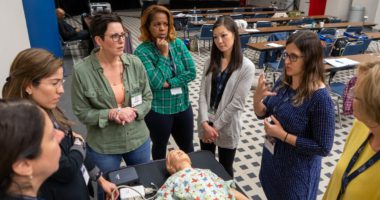 For years, allergists were assured that changes in health care delivery would revolutionize the way they practiced medicine. Have predictions fulfilled their expectations?
For years, allergists were assured that changes in health care delivery would revolutionize the way they practiced medicine. Have predictions fulfilled their expectations?
In the annual Bela Schick Lecture, which has traditionally focused on the future of allergy, Allen Meadows, MD, FACAAI, asked Is it FINALLY a Brave New World? with the overarching theme of, “the more things change, the more they stay the same.”
“We have been promised that new systems being proposed for medicine will change the future of medicine forever. But none, except Medicare, have quite lived up to the hype,” said Dr. Meadows, Advocacy Council chair.
In his forward-looking presentation, he explored furtive promises in the light of past failures by comparing and contrasting the successes of various health plan types and initiatives, including:
- Health maintenance organizations
- Accountable care organizations
- Alternative payment models
- EHRs and ePrescribing
How have these initiatives improved the way allergists practice medicine to date? What have they taught us about the capacity of the health care delivery system to best serve our patients and our practices?
“EHR’s are a complete disaster: they are designed to get us paid, not take care of patients,” said Dr. Meadows. “Why not eliminate the antiquated requirement of the detailed history and instead accept an up-to-date electronic flowsheet, or decision-making tool, to get paid.”
“I’d like to see a system where doctors are only held accountable for variables they can control, and held harmless for expenses out of their control. In the past, capitated plans put doctors at risk for expenditures they could not control. The past systems created unhealthy competition between specialists and primary doctors. I’d like to see a system designed that creates a TRUE partnership, where BOTH are rewarded for good outcomes. In the final analysis, I hope the clinician who listens to his patients and puts them first will be rewarded.”


